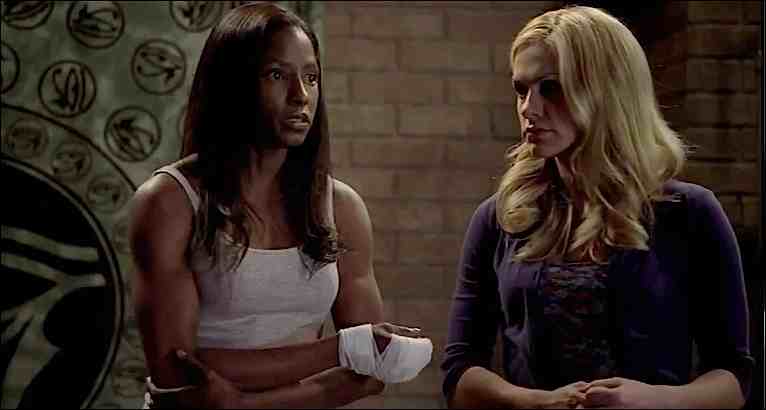Written by Josh Singer
Directed by Bill Condon
UK/Belgium/USA, 2013
“Most good stories start at the beginning,” intones a journalist during The Fifth Estate, a bold statement to make in a film that starts very near the end. The story of how WikiLeaks, and its enigmatic Australian founder Julian Assange, rose to worldwide prominence and notoriety over the last 5 years, is not without merit, but this adaptation fails to reach the same height of earned importance. An esteemed ensemble, led by the seemingly ubiquitous Benedict Cumberbatch (say those three words ten times fast), isn’t able to lift the script above the murk, though; its structure cannot help but bring to mind the excellent and sharply written Aaron Sorkin script for The Social Network. Though aspiring to be a hybrid of that film and something like All The President’s Men is admirable, The Fifth Estate doesn’t come within spitting distance of either.
Cumberbatch is Assange, the rumpled WikiLeaks leader who hopes to bring his site’s message of free and protected information to the masses. At first, it’s just him, some volunteers in far-flung places around the globe, and his close friend and colleague Daniel Domscheit-Berg (Daniel Brühl, again playing the levelheaded half of a friction-heavy duo, just like he did in Rush). They both appear to share the same goals, but as WikiLeaks’ sources offer more damning information, Daniel becomes concerned that the work he’s doing is destroying personal privacy, while Julian refuses to stop in the face of pressure. Is it right for one website to go unchecked and unchallenged in its neverending quest for truth and justice? Is it morally bankrupt?
Such questions are posed in The Fifth Estate, just as they’ve been posed in the time since WikiLeaks broke into the mainstream, with its massive information dump of hundreds of thousands of cables from within the United States government; said event suffers in its depiction here, as it’s the basis for screenwriter Josh Singer’s unnecessary reliance on the in medias res storytelling device. (Maybe it’s time to retire that cliche from modern cinema.) Singer and director Bill Condon, however, don’t do much more than reignite the same debates that have been roiling for quite some time. Even in its examination of Assange, the film stumbles.
Cumberbatch is no slouch, of course; perhaps the problem is that, even in how he’s described and presented in the mainstream media, Julian Assange comes off as being one fluffy white cat away from being a James Bond villain, and Cumberbatch’s performance sometimes tiptoes awfully close to such mania. At one point, his Assange mentions that he may be mentally somewhere on the spectrum of autism, explaining his selfish and sometimes robotic attitude. And when he realizes he’s being tailed by agents of multiple foreign governments in the same bar, Assange’s hands begin shaking in terror. These moments of humanity and complexity, though, are too rare. Because Domscheit-Berg does not seem to ever truly know Julian Assange, neither do we. Either Assange is too slippery to pin down even in a film script, or Singer’s writing is too vague. Sometimes, Julian is rakish and charming; sometimes, he’s mercurial. The closest he comes, at least in the film, to sounding totally honest is when he’s hot and bothered. (Anyone keeping up with the news around The Fifth Estate may be cheerfully caught off guard when the film, near the very end, breaks the fourth wall, no doubt accidentally referencing the real-life Assange’s letter to Cumberbatch, urging him to quit the business and back away from the vagaries of Hollywood.)
Unlike The Social Network—and it is enormously hard to separate that film from this, especially when watching Julian rip into Daniel for having been dubbed a “co-founder” of WikiLeaks, much as Eduardo Saverin was eventually cast out of Facebook for having his name on the masthead—The Fifth Estate has trouble filling in the background players. The cast is stacked to the rafters, with Laura Linney, Stanley Tucci, Anthony Mackie, Peter Capaldi, David Thewlis, Dan Stevens, Carice van Houten, and more among the ensemble. So few of them, sadly, have anything impactful to do. Linney, Tucci, and Mackie all play higher-ups in the US government, worried about WikiLeaks and its effect on their work. While it’s hard to argue with watching a scene where any or all of them bounce off each other, their combined screen time can’t be more than 25 or 30 minutes. It makes sense to focus not just on those who act to reveal harsh truths, but those who are affected by said revelations. The Fifth Estate doesn’t have the proper balance between the two groups, though; one part of Linney’s subplot is offering safe passage to a longtime Libyan source, and it goes nowhere, fizzling out well before it reaches a natural end.
Maybe that’s the true problem with The Fifth Estate: its conflict has not ended, and may never end. Even after Julian Assange is gone, the questions he has brought up through WikiLeaks will remain. Is it right to demand transparency from a corporation while also attempting to enforce personal privacy? Is it even possible? Doesn’t the attempt to achieve transparency on a wide scale cause privacy on a small scale to be shaken or possibly broken? There is no end to this debate, nor to the power wielded by a small group of people with the right connections and presumably noble goals. And there is no end to The Fifth Estate, which appropriately closes with contradictions: Julian Assange’s arrest charges for sexual assault are described in superimposed captions, coming at the tail end of a film that presents him as an almost asexual being. Considering that its focus is on the hunt for answers, The Fifth Estate is a film that is tacitly unable to offer such resolution to any pressing questions.
— Josh Spiegel








